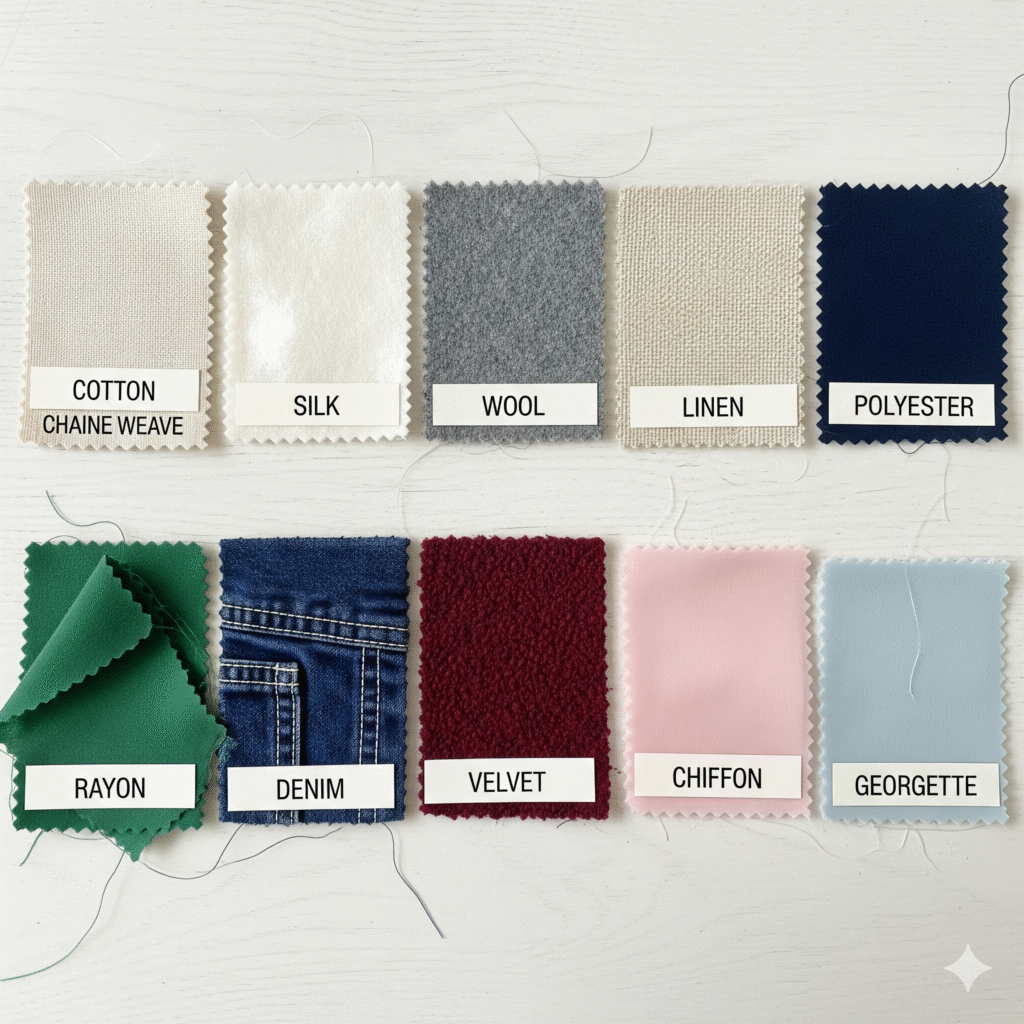When it comes to fashion, home décor, or everyday wear, the first thing that matters after the design is the fabric. The fabric you choose not only decides how stylish you look but also how comfortable and confident you feel. Many people often ask, “Which type of fabric is best?”—but the truth is, there isn’t just one perfect fabric. The “best” depends on the purpose, weather, lifestyle, and even your personal preferences.
In this guide, we’ll explore different types of fabrics, their advantages and disadvantages, and how to choose the right one for your needs. By the end, you’ll know exactly which fabric is best for you.

Table of Contents
- Introduction
- Why fabric choice matters
- 10 Best Types of Fabrics and Their Qualities
- Cotton
- Silk
- Linen
- Wool
- Polyester
- Rayon
- Denim
- Velvet
- Georgette
- Chiffon
- Natural vs. Synthetic Fabrics: Which is Better?
- Factors to Consider When Choosing the Best Fabric
- Weather & Climate
- Occasion
- Skin Sensitivity
- Budget
- Maintenance
- Quick Comparison Table of Fabrics
- FAQs on Fabrics
- Which type of fabric is best for summer?
- Which type of fabric is most durable?
- Which fabric is best for winter?
- Which fabric looks the most elegant?
- Which fabric is best for sensitive skin?
- Conclusion: So, Which Type of Fabric is Best?
Why Fabric Choice Matters

Before diving into the list of fabrics, let’s understand why choosing the right material is so important:
- Comfort: The wrong fabric can feel itchy, sticky, or even too stiff.
- Durability: Some fabrics last longer, while others wear out quickly.
- Breathability: Especially in hot or humid climates, breathable fabrics make a huge difference.
- Maintenance: Certain fabrics need dry cleaning, while others can be easily washed at home.
- Look and Feel: The fabric adds texture, shine, and elegance to your outfit or home items.
Now, let’s compare the most popular fabrics and decide which ones stand out.
10 Best Types of Fabrics and Their Qualities
1. Cotton
Cotton is one of the oldest and most widely used fabrics in the world.
Pros:
- Soft and breathable
- Perfect for hot climates
- Easy to wash and maintain
- Absorbs moisture well
Cons:
- Prone to wrinkles
- Can shrink after washing
- Not very durable compared to synthetic fabrics
Best For: Everyday wear, summer outfits, bedsheets, and kids’ clothing.
2. Silk
Silk has always been associated with royalty, luxury, and elegance.
Pros:
- Luxurious shine and texture
- Gentle on the skin
- Naturally hypoallergenic
- Keeps you cool in summer and warm in winter
Cons:
- Expensive
- Requires delicate care (hand wash or dry clean)
- Can lose shine if not stored properly
Best For: Sarees, wedding outfits, party wear, scarves, and luxury bedding.
If you want to know “How to wash Silk Saree at home?” you can visit on our Blog.
3. Linen
Linen is a natural fiber made from flax plants and is popular for its cooling properties.
Pros:
- Extremely breathable
- Lightweight and perfect for summer
- Natural texture adds elegance
- Eco-friendly and sustainable
Cons:
- Wrinkles easily
- Slightly rougher texture compared to cotton
- Expensive than cotton
Best For: Summer dresses, shirts, trousers, curtains, and upholstery.
4. Wool
Wool is best known for its warmth and softness, especially during winter.
Pros:
- Provides insulation in cold weather
- Soft and comfortable
- Available in various textures (cashmere, merino, alpaca)
- Naturally wrinkle-resistant
Cons:
- Can feel itchy for some people
- Requires careful washing (often dry clean only)
- Not suitable for hot climates
Best For: Winter coats, sweaters, blankets, and suits.
5. Polyester
Polyester is a synthetic fabric that has gained massive popularity for its durability and affordability.
Pros:
- Strong and durable
- Resistant to wrinkles and shrinkage
- Affordable compared to natural fabrics
- Dries quickly
Cons:
- Less breathable
- Can feel sticky in hot weather
- Not eco-friendly
Best For: Sportswear, daily wear, home furnishings, and blends with other fabrics.
6. Rayon
Rayon is a semi-synthetic fabric made from natural cellulose fibers.
Pros:
- Soft and silky texture
- Absorbs moisture well
- Cheaper alternative to silk
- Versatile for both casual and formal wear
Cons:
- Weak when wet
- Requires gentle handling
- Can shrink easily
Best For: Dresses, sarees, blouses, and linings.
7. Denim
Denim is a durable cotton twill fabric mostly associated with jeans.
Pros:
- Extremely durable
- Long-lasting and versatile
- Stylish and trendy
- Easy to pair with other fabrics
Cons:
- Thick and heavy (not ideal for hot weather)
- Takes longer to dry
- Can feel stiff initially
Best For: Jeans, jackets, skirts, and casual wear.
8. Velvet
Velvet is a luxurious, soft fabric known for its rich texture and shine.
Pros:
- Rich and elegant look
- Soft and smooth texture
- Great for winter wear
- Adds glamor to outfits and interiors
Cons:
- Heavy and less breathable
- Requires delicate care
- Expensive compared to regular fabrics
Best For: Party wear, wedding outfits, blazers, curtains, and sofas.
9. Georgette
Georgette is a lightweight, flowy fabric often used in ethnic and western dresses.
Pros:
- Flowy and drapes well
- Lightweight and breathable
- Perfect for party and casual wear
Cons:
- Can be see-through (needs lining)
- Delicate fabric—prone to tears
- Not as durable as cotton or polyester
Best For: Sarees, gowns, dresses, kurtis, and dupattas.
10. Chiffon
Chiffon is another sheer and lightweight fabric, popular for its soft, elegant flow.
Pros:
- Lightweight and stylish
- Perfect for layering
- Adds grace and beauty
Cons:
- Very delicate (tears easily)
- Needs careful handling
- Not suitable for daily wear
Best For: Sarees, gowns, dupattas, and scarves.
To buy a Best Fabric You can visit on this Link
If you want to check the Fabric Quality you can watch below given video.
Natural vs. Synthetic Fabrics
Which type of Fabric is Better?
When choosing fabrics, one common confusion is between natural fabrics (cotton, silk, wool, linen) and synthetic fabrics (polyester, nylon, rayon).
- Natural Fabrics are breathable, skin-friendly, and eco-friendly. They’re great for comfort but can be expensive and require more care.
- Synthetic Fabrics are affordable, durable, and easy to maintain. However, they’re less breathable and not sustainable.
Verdict: For daily comfort and health, natural fabrics are the best. For affordability and durability, synthetic fabrics win.
Factors to Consider When Choosing the Best Fabric
When you ask, “Which type of fabric is best?”—remember it depends on multiple factors:
- Weather & Climate
- Cotton and linen for summer
- Wool and velvet for winter
- Silk and polyester blends for year-round use
- Occasion
- Silk, chiffon, velvet for weddings and parties
- Cotton, rayon, and denim for daily wear
- Polyester for sportswear
- Skin Sensitivity
- Choose soft, natural fabrics if you have sensitive skin
- Avoid synthetic fabrics if you sweat a lot
- Budget
- Cotton, polyester, rayon are budget-friendly
- Silk, wool, and linen are premium choices
- Maintenance
- Cotton, polyester, denim are easy to wash at home
- Silk, wool, chiffon, velvet need special care
Quick Comparison Table of Fabrics
| Fabric | Comfort | Durability | Maintenance | Best For |
|---|---|---|---|---|
| Cotton | High | Medium | Easy | Everyday wear |
| Silk | High | Medium | Delicate | Luxury outfits |
| Linen | High | High | Moderate | Summer clothing |
| Wool | High | High | Delicate | Winter wear |
| Polyester | Medium | High | Easy | Sportswear |
| Rayon | Medium | Low | Moderate | Dresses |
| Denim | Medium | High | Easy | Jeans |
| Velvet | High | Medium | Delicate | Party wear |
| Georgette | Medium | Low | Delicate | Sarees, dresses |
| Chiffon | Medium | Low | Delicate | Party wear |
FAQs on Fabrics
1. Which type of fabric is best for summer?
Cotton and linen are the best fabrics for summer because they are breathable, lightweight, and absorb sweat.
2. Which type of fabric is most durable?
Denim and polyester are highly durable fabrics, making them perfect for long-term use.
3. Which fabric is best for winter?
Wool, velvet, and fleece are the best fabrics to keep you warm during cold weather.
4. Which fabric looks the most elegant?
Silk and velvet are considered the most elegant fabrics due to their luxurious shine and rich texture.
5. Which fabric is best for sensitive skin?
Cotton and silk are gentle and hypoallergenic, making them perfect for sensitive skin.
Conclusion
There isn’t one single answer to the question “Which type of fabric is best”—because the best fabric depends on your needs.
- For everyday comfort → Choose cotton or linen.
- For luxury and elegance → Go with silk or velvet.
- For durability and affordability → Pick denim or polyester.
- For winter warmth → Wool is unbeatable.
- For lightweight party wear → Georgette and chiffon are excellent.
In short, the “best fabric” is the one that balances comfort, style, purpose, and budget for you.
So next time you shop for clothes or home textiles, don’t just focus on color or design—pay close attention to the fabric. After all, it’s the fabric that truly defines the feel, durability, and overall beauty of what you wear.